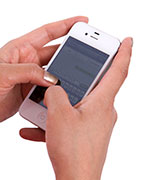- 8 Ways to Increase Dopamine Naturally
- 7 Best Breads for Maintaining Stable Blood Sugar
- Gelatin vs. Collagen: Which is Best for Skin, Nails, and Joints?
- The Long-Term Effects of Daily Turmeric Supplements on Liver Health
- Could Your Grocery Store Meat Be Causing Recurring UTIs?
- Are You Making This Expensive Thermostat Error This Winter?
- Recognizing the Signs of Hypothyroidism
- 10 Strategies to Overcome Insomnia
- Could Artificial Sweeteners Be Aging the Brain Faster?
- Techniques for Soothing Your Nervous System
Daily Smartphone Use Might Offer Clues to Depression


A new study suggests that how you use your smartphone could shed light on whether you might suffer from depression.
The small study — involving just 20 women and eight men, averaging 29 years of age — looked at data from the people’s phones to track the number of minutes they used their phone, as well as their locations throughout the day.
The researchers from Northwestern University Feinberg School of Medicine in Chicago tracked two weeks’ of phone use and GPS data from the 28 participants’ smartphones.
The more time a person spent on his or her phone, the more likely they were to be depressed, according to the team led by clinical psychologist David Mohr, who directs the university’s Center for Behavioral Intervention Technologies.
For example, average daily smartphone use by those with depression was 68 minutes, compared with only 17 minutes by those without depression, his team found.
Also, the GPS data showed that people who were depressed tended to spend more time at home, or in fewer locations, compared to people who weren’t depressed. People who had less of a regular day-to-day schedule, or who left home and went to work at different times each day, were also more prone to depression, the researchers contended.
Overall, the smartphone data was 87 percent accurate in spotting people with symptoms of depression, according to the study authors, who published the findings July 15 in the Journal of Medical Internet Research.
Mohr said in a university news release that he believes that simply by looking at phone data, “we can detect if a person has depressive symptoms and the severity of those symptoms without asking them any questions.”
What’s more, “phones can provide data unobtrusively and with no effort on the part of the user,” he said.
Two experts in psychiatric health took a more cautious view, however.
Dr. Aaron Pinkhasov is chair of the department of behavioral health at Winthrop-University Hospital in Mineola, N.Y. He agreed that “at least some patterns of data [from smartphones] seem to correlate with possible mood disorders.”
However, Pinkhasov said the study sample was slanted heavily towards older women, who tend to have higher rates of depression. He also believes that physicians and patients should be wary of relying too much “on technology and self-diagnosis” via smartphone.
But another expert said the study is in tune with a trend to track health and health care using new technologies.
“New ‘apps’ will help to identify high-risk patients and offer treatments that can help,” said Dr. Scott Krakower, assistant unit chief of psychiatry at Zucker Hillside Hospital in Glen Oaks, N.Y. “The question will be how to find a balance between finding the right treatment, while respecting privacy at the same time.”
“Of course,” he added, “we should not negate the value of human input — a continued, necessary staple in this computerized world.”
More information
The American Academy of Family Physicians has more about depression.
Source: HealthDay
Copyright © 2026 HealthDay. All rights reserved.










